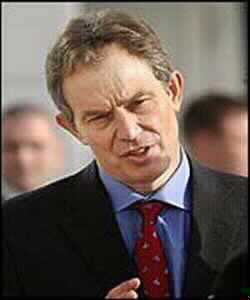The UK Prime Minister, Tony Blair, has said the UN weapons inspectors in Iraq will be given more time - but the UN's authority is at stake. Mr Blair was speaking a day after chief weapons inspector Hans Blix told the UN Security Council that after almost three months of work, his team had found no weapons of mass destruction in Iraq. "There will be more time given to inspections," Mr Blair told a Labour Party conference in Glasgow, Scotland.
"The time needed is not the time that it takes the inspectors to discover the weapons. They are not a detective agency," Mr Blair warned.
"The time is the time necessary to make a judgment: is Saddam (Hussein) prepared to co-operate fully or not? If he is, the inspectors can take as much time as they want."
Mr Blair said he hoped Iraq would be disarmed peacefully, but if the issue was not dealt with then the authority of the UN would be compromised and a far bloodier conflict would eventually come.
Divisions
The UN Security Council remains deeply divided over the Iraq crisis.
France, China and Russia say inspectors should be given the time they need to complete their task, but the US, backed by Britain, says Iraq must not be allowed to string out the inspections process.
Speaking at the special UN session on Friday, US Secretary of State Colin Powell said the Security Council should "in the near future consider serious consequences" - code for war on Iraq.
Earlier, Mr Blix said that while serious questions did still remain - notably the disappearance of large quantities of chemical and biological material - definite progress had been made.
A BBC correspondent at the UN says the US admits privately it does not have the nine votes needed to secure a UN mandate for war.
The diplomats later went into private session, after which Mr Powell said the US still hoped to work through the UN to ensure Iraq had disarmed.
"We will continue to debate this issue within the Council," he said when asked if the US would seek a second resolution explicitly authorising war.
'Change needed'
The inspectors' reports are likely to determine whether the US and Britain, its staunchest ally, decide to seek a second UN resolution authorising the use of force to disarm Iraq.
Australia's Prime Minister John Howard on Saturday said that any change of heart in Iraq was down to the American position, not the UN inspectors.
However, Chinese Foreign Minister Tang Jiaxuan said the inspection process had made progress and clarified issues, but more work needed to be done. It was important, he said, for the inspection process to continue and for the Security Council to pursue every possible avenue to avoid war.
In his report, Mr Blix said that while disarmament could still be achieved, "the issues of anthrax, the nerve agent VX and long-range missiles [are]... perhaps the most important problem we are facing.
"Iraq itself must squarely tackle this task and avoid belittling the questions," he said. The chief inspector said 1,000 tons of banned chemicals and other proscribed weapons remained unaccounted for.
UN doubts
Mr Blix, however, cast doubt on American intelligence material presented to the Security Council last week by Colin Powell. He said he had no evidence that Iraq had had advance warning of inspections - as has been claimed by the US - and said images said to show suspicious movement at an Iraqi weapons site could have been pictures of "routine activity".
Mr Blix confirmed a declaration by arms experts on Wednesday that Iraq's Al-Samoud missile programme exceeded UN-imposed limits on range and was "therefore proscribed for Iraq".
He said that while inspections had been carried out without problems, Iraqi compliance with UN resolution 1441 meant "more than opening doors".
He said private interviews with Iraqi scientists - a key sticking point - had "proved informative", but no interviews had taken place on the UN's terms since 9 February.
The head of the International Atomic Energy Agency (IAEA), Dr Mohamed ElBaradei, repeated his finding that his inspectors had discovered no evidence that Iraq was restarting its nuclear programme.
He said, however, that documents passed on by Iraq last week did not answer outstanding questions about Iraq's nuclear programme since 1998.
PHOTO CAPTION
"I hope even now Iraq can be disarmed peacefully, with or without Saddam" Tony Bla
- Author:
BBC - Section:
WORLD HEADLINES


 Home
Home Discover Islam
Discover Islam Quran Recitations
Quran Recitations Lectures
Lectures
 Fatwa
Fatwa Articles
Articles Fiqh
Fiqh E-Books
E-Books Boys & Girls
Boys & Girls  Hajj Rulings
Hajj Rulings Hajj Fatwas
Hajj Fatwas














